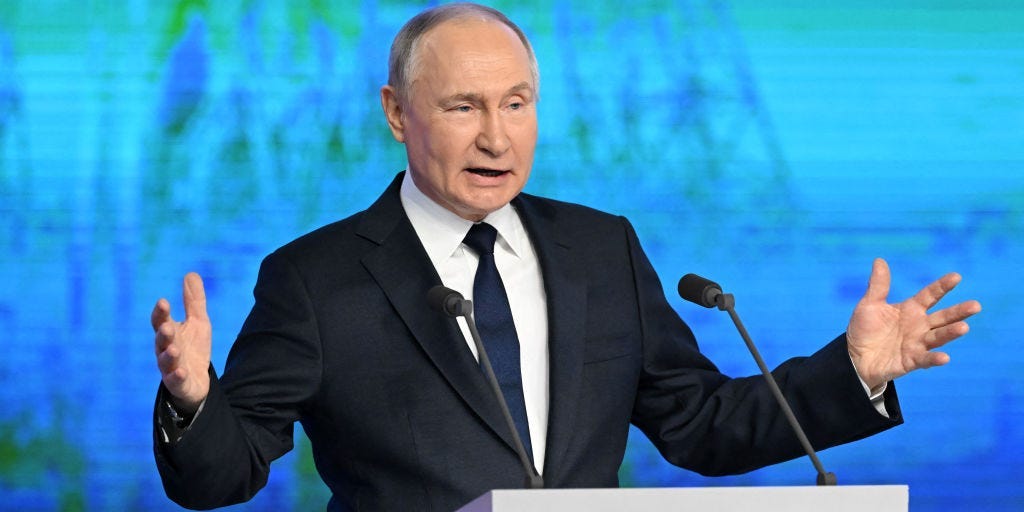- Russians are voting in an election this weekend that Vladimir Putin is widely expected to win.
- But Putin’s victory isn’t merely about winning.
- He needs to win big to legitimize his position as the leader of Russia.
Thanks for signing up!
Access your favorite topics in a personalized feed while you’re on the go.
download the app

Russians are heading to the polls from Friday to Sunday to cast their votes for their next president.
Analysts say there’s little doubt Vladimir Putin, 71, will win, even as the Ukraine war drags into its third year. After all, his challengers — who were approved to run by the country’s election commission — are far from his level of clout and influence.
Furthermore, Russia’s economy is booming and even at risk of overheating as wartime production and spending keep the country afloat.
Russia’s GDP grew 3.6% in 2023 and the International Monetary Fund expects its economy to grow 2.6% this year. Unemployment is around a record low, and wages are soaring even if inflation is running hot at about 7%.
As in other places around the world, the rosy economy may be enough to sway voters. The Levada Centre, a major independent Russian pollster, found that Putin’s approval rating hit 85% in January.
But for Putin, merely winning has never been enough — and 2024 looks no different.
Putin needs to show that Russians really want him to lead
For Putin, it’s not about winning. It’s about winning big.
As Thomas Graham, a fellow at the Council on Foreign Relations, wrote on March 7: “Just winning has never been enough for Putin. He must win in a fashion that demonstrates that he remains the master of the Russian political system.”
David Szakonyi, a political-science professor at George Washington University, told Business Insider that Russian authorities placed so much emphasis on voter turnout rates for the election that state-linked employers would pressure their employees to show up at the ballot boxes.
Szakonyi, who’s the author of “Politics for Profit: Business, Elections, and Policymaking in Russia,” added that ensuring the facade of a free and fair election was important to Putin because he could show Russians and the rest of the world that he had been democratically elected.
He said there was pressure for Putin to show that he’s not only popular but that he also has a “natural and justified defensible place in Russian politics.”
‘It’s the economy, stupid,’
As is the case with voters around the world, Russians “vote with their pocketbooks,” Szakonyi said.
“When things are really dismal economically, they tend to blame politicians, and Putin himself has suffered from a popularity standpoint at various times the last two decades when the economy stuttered,” he added.
This time, though, the economy is in Putin’s favor. This is — in no small part — thanks to the work of Elvira Nabiullina, the governor of the Central Bank of Russia. She tried to quit over the Ukraine war barely a month into the invasion, but Putin rejected her resignation, Bloomberg reported.
Nabiullina, previously well-respected by her international peers, has now become Putin’s top technocrat and economic policymaker by helping to keep the economy going during the war with Ukraine and amid Western sanctions.
“If the war was initially Putin’s, it is now Russia’s. The elites either actively support the war or have been implicated in it,” Graham wrote.
While Putin’s officials have traded barbs openly regarding how to run the economy, it’s unclear what they think of the war and the economy on a personal level.
Some economists say Russia’s war-driven economy and generous state spending are unsustainable in the long run.
But in the short term, the massive government spending and economic changes are keeping the economy afloat.
“The country’s economy might not grow at the same pace as before, but they’re definitely not nearly in a crisis situation people thought it would be when the war broke out,” Szakonyi said.
This may be enough to secure a win for Putin.
“Vladimir Putin will use the vote in his propaganda as proof of overwhelming support for the invasion of Ukraine,” Bartosz Sawicki, a market analyst at Conotoxia, a Polish fintech firm, told BI. “The astonishing resilience of the economy also plays a significant role in his pitiful spectacle.”


